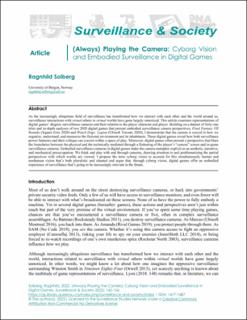(Always) Playing the Camera: Cyborg Vision and Embodied Surveillance in Digital Games
Journal article, Peer reviewed
Published version

Åpne
Permanent lenke
https://hdl.handle.net/11250/3028010Utgivelsesdato
2022Metadata
Vis full innførselSamlinger
Sammendrag
As the increasingly ubiquitous field of surveillance has transformed how we interact with each other and the world around us, surveillance interactions with virtual others in virtual worlds have gone largely unnoticed. This article examines representations of digital games’ diegetic surveillance cameras and their relation to the player character and player. Building on a dataset of forty-one titles and in-depth analyses of two 2020 digital games that present embodied surveillance camera perspectives, Final Fantasy VII Remake (Square Enix 2020) and Watch Dogs: Legion (Ubisoft Toronto 2020), I demonstrate that the camera is crucial in how we organize, understand, and maneuver the fictional environment and its inhabitants. These digital games reveal how both surveillance power fantasies and their critique can coexist within a space of play. Moreover, digital games often present a perspective that blurs the boundaries between the physical and the technically mediated through a flattening of the player’s “camera” screen and in-game surveillance cameras. Embodied surveillance cameras in digital games make the camera metaphor explicit as an aesthetic, narrative, and mechanical preoccupation. We think and play with and through cameras, drawing attention to and problematizing the partial perspectives with which worlds are viewed. I propose the term cyborg vision to account for this simultaneously human and nonhuman vision that’s both pluralistic and situated and argue that, through cyborg vision, digital games offer an embodied experience of surveillance that’s going to be increasingly relevant in the future.
